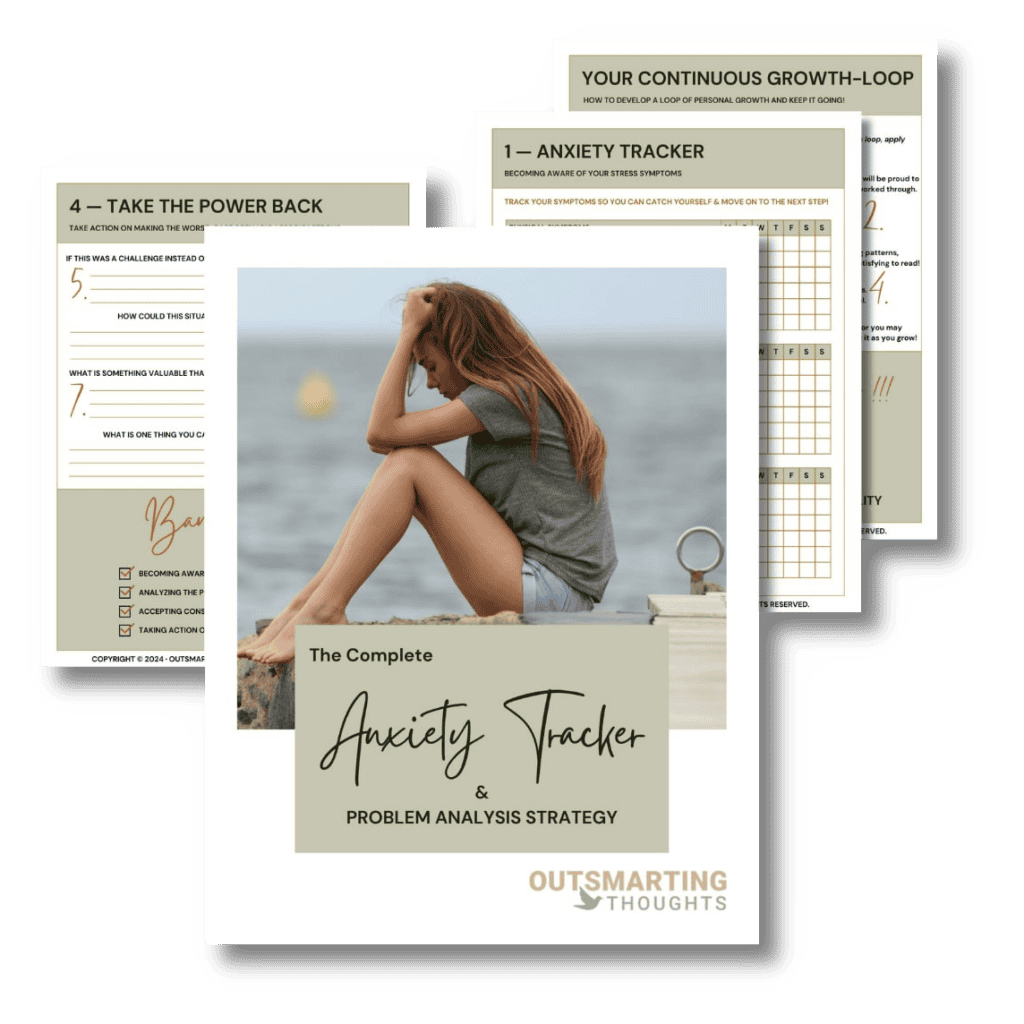Wanna know what personal autonomy in relationships really looks like when you’re not trying to control anyone, but also refuse to be controlled? This post is dedicated to showing you how to hold your ground in love without turning into a people-pleasing puddle, or a self-absorbed wall.
If you’re an overachiever or overthinker, chances are you’ve compromised too much in your life. Maybe you’ve bent over backward to avoid conflict. Maybe you’ve made your schedule (or self-worth) completely dependent on someone else’s needs. It’s more common than you think. We overachievers think we’re being good partners by being endlessly available, endlessly flexible, and endlessly forgiving. But when you uncover the needs under the behavior, it’s way more about forgetting that you’re a captain too.
What you’re going to learn is how personal autonomy and intimacy can absolutely coexist. You’ll see what autonomy looks like in strong, healthy partnerships, how to spot when you’ve lost yours, and how to reclaim it without starting unnecessary drama.
After you have learned to lead yourself while loving someone else at the same time, you’ll be able to set boundaries without dying of guilt, ask for what you need without shame, and stop bleeding your energy dry trying to keep the peace. You’ll feel stronger, more emotionally stable, more respected, and wayyyy more like yourself; even when you’re deeply connected to others.
This post is all about personal autonomy in relationships, so you can stop disappearing in love and start showing up in full alignment.
Personal Autonomy In Relationships
The psychology behind personal autonomy in relationships runs way deeper than just ‘learning to say no’. You’ve probably been taught to either sacrifice yourself or shut others out. But what I’d like you to consider is this: autonomy isn’t about pushing people away. AT ALL. Instead, it’s about knowing you’re still allowed to make decisions, allowed to be yourself, and allowed to keep your dignity intact.
Maintaining personal autonomy in relationships means that you’re both captains of one ship, steering to the same destination. You’ve each got a route, a compass, and responsibilities on deck. That doesn’t mean you don’t help each other. But it does mean you do it without hijacking the ship, or jumping overboard at the first sign of disagreement.
This post will show you what it actually looks like to stay grounded, honest, true to yourself, and in control of your own resources; even when your heart is wide open. So let’s see how we can lead ourselves, without losing connection, and how to stop measuring love by how much of ourselves we’ve abandoned:
Healthy Relationships Aren’t Supposed To Go At The Cost Of Yourself
Let’s not sugarcoat it: too many people think love is measured by sacrifice. It’s a codependent creed. You give more, you bend more, you shrink more; and somehow, that’s supposed to ‘prove how much you care’. But what it truly is about is this: if it costs you your self-respect, it’s not a healthy dynamic or love. Instead, it’s self-abandonment dressed up as devotion.
Personal autonomy in a relationship means you know who you are while loving someone else. It’s about staying true to yourself despite managing conflicts & incompatibilities. You don’t dissolve into their moods or rearrange your life to avoid tension. Instead, you connect to your own clarity, values, and emotional baseline; even when things heat up.
That doesn’t mean you don’t compromise. However, instead of compromising at the cost of someone, you always aim to make it a win-win. It’s about keeping team spirit in conflict. That means stop pretending that constantly giving in is noble. First thing to remember is that a real healthy compromise comes from two autonomous captains deciding together, not one person being guilt-tripped into obedience.
RELATED POST:
How To Reclaim Your Power: An Overachiever’s Strategy For Leveling Up In Strength & Autonomy
When you lose your autonomy, it’s a heavy price to pay: you don’t just lose time. You lose trust in yourself. You start spiraling in self-doubt, questioning your instincts and gut feelings, censoring your voice, and overthinking every interaction. That’s not emotional intimacy, but a nervous system crumbling.
Any healthy relationship HAS TO HAVE deal-breakers! Think about it: do you really mean unconditional love? Unconditional means no conditions, right? So. If he cheats, do you stay? If he becomes violent, too? Do you see how boundaries HAVE to be there? The healthiest relationships are built on mutual respect, not on endless accommodation.
Signs You’ve Lost Autonomy In A Relationship
You often do not see those moments where autonomy slips. Instead, it secretly slips in. It starts with the little things; not speaking out your own truth to avoid a conflict, or deferring to someone else’s plan before even asking yourself what you want. You don’t speak up. Not because you don’t care, but because deep down you feel you don’t deserve to, and you don’t want to cause a scene. Over time, you stop checking in with yourself altogether.
If you catch yourself saying yes while your whole body screams no internally, that’s not love. That’s people-pleasing at the cost of yourself. If you feel like you’re walking on eggshells or editing your personality, you’ve crossed a line. When your needs consistently come last and your opinions shrink, that’s not connection anymore, but codependence.
You might also notice resentment building in yourself. This isn’t because you’re mean or selfish, but because your boundaries were crossed so many times you forgot where they were. Deep down, it’s like nobody really has your back, and that includes YOU.
Personal autonomy is anything but a luxury. It’s oxygen. You don’t earn love by making yourself smaller. You create real connection by being your whole self, quarks and all, and by honoring that you’re resources (your time, attention & presence) are a gift. Not a guarantee. If your peace is always the price, then the relationship is not sustainable.
Let’s make managing stress & anxiety a little bit more practical by diving into our problem analysis strategy. There’s a solution to every problem! You’ll feel extremely relieved once you have a strategy to get out of the messy parts. We made a printable & anxiety tracker to help you out. Simply fill out the form below:

Want a free
ANXIETY TRACKER &PROBLEM ANALYSIS STRATEGY? Overcome your anxiety and stop overthinking with this
FREE Anxiety Tracker & Problem Analysis Strategy
Simply fill out the form below to get this strategy
delivered straight to your inbox!
Reclaiming Autonomy Without Starting A Fight
You don’t need to flip the table to get your autonomy back. What you need is a plan that’s based on conscious choice, respect, and some soul-searching. Reclaiming your power doesn’t mean withdrawing, but reconnecting to your values, opinions, and acting from a place of self-leadership.
So start by getting honest with yourself. What are you giving that you never fully agreed to? What would you like to do differently? Then start taking steps toward expressing it, saying it in neutral, grounded ways. Non-violent communication might be a method you want to explore to accompany this journey. You don’t need drama. You need directness.
Try this: ‘I’ve noticed that I haven’t been checking in with my own limits & borders, and I want to start doing that more’. That’s not an attack. That’s a captain with a declaration to take back the ship. You can also re-negotiate shared routines or patterns. If your time has become everyone else’s by default, block out time for yourself and keep that commitment. When you give yourself that level of respect, others have no choice but to align with that, too.
RELATED POST:
How To Be Assertive Without Being The Asshole: 4 Steps To Master Conflict
Autonomy doesn’t threaten healthy relationships, but it will make the toxic folks detach. (Double bonus, am I right?) When someone tries to make you feel guilty for honoring your limits, remember: guilt is not a moral compass. It’s often a byproduct of unlearning compliance & obedience.
You get to draw lines and stay soft. You get to change your mind. Most importantly, you get to take up space in the relationship without making the other person small. Real love can handle the real you. And if it can’t? That tells you everything.
Loving Without Losing Yourself
Autonomy doesn’t mean you don’t care. It means you don’t disappear. And if someone has made you feel like you’re selfish for having needs or boundaries, that says more about their comfort zone than your character. Being the captain of your life isn’t cold. It’s the most responsible thing to do. You show up to your relationships as a full, honest, flawed, present human; not as a shape-shifter. And that’s where true intimacy begins.
The beauty of it is that you recognize others as captains of their ships & resources too. They have their own direction, preferences, resources, and limits. Your job isn’t to steer their ship. It’s to collaborate: two sovereign people choosing to move forward to the same destination. Not out of fear. But out of choice.
When you love from that place, it’s not tight or transactional. It’s free, reliable, and full of trust. As Maya Angelou said, ‘Love liberates. It does not bind.’ That means you get to walk beside someone, not fold yourself into their path. The more autonomy you have, the safer you become, for yourself and others. You stop needing to control everything. You stop tolerating being treated like shit. And you start building something that’s actually mutual.
Do not apologize for protecting your resources. That money is hard-earned, and all yours, as is your time, energy & bandwidth. You’re not difficult. You’re discerning. That’s not ‘high-maintenance’, you just finally know what you need. Love without autonomy is codependency. Autonomy without love is isolation. But when you combine the two? Then you get a partnership that’s powerful, not performative.
Personal Autonomy In Relationships (Summary)
Personal autonomy in relationships is way more than just ‘being independent’. It’s about knowing what’s yours to manage; and honoring it without guilt. In this post, you explored how love should never require you to abandon yourself just to stay connected.
You learned how to recognize the early signs that you’ve slipped out of captain mode by paying attention to your resentments, and you learned how to take the power back without creating unnecessary drama by stating in non-violent communication ‘that the captain is back on deck’. On top of all that, you also saw why autonomy and compassion aren’t opposites, but allies.
You do not need to prove your love by breaking your boundaries. You prove it by showing up honestly, authentically, respectfully, and consistently; for yourself, AND for the people you care about. I wish you the absolute best!
This post was all about personal autonomy in relationships, so you can stop disappearing in love and start showing up in full alignment.
We aim to help you out as much as possible, but please keep in mind that the content is only for general informational and educational purposes. We offer our services based on independent research and life-experience only, and so our strategies can never serve as a substitute for professional advice. Trust me, we do not have 'everything figured out', are all still huge works in progress, but hey, what works for us, might work for you too! This is allll up for you to decide... It might not work for you, and that's okay, so cherrypick the stuff that resonates and leave the stuff that doesn't, and let's go!








